King Henry III of England
Henry III was one of the longest-serving kings of England in history. He came to the throne at a turbulent time, when he was very young. He ruled 56 years, struggling against France and against his own people, and oversaw the gathering of the first Parliament. 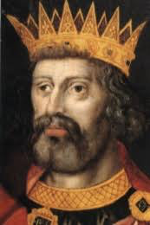
Henry was born at Winchester in 1207, the son of King John and Isabella of Angouleme. Not much is known of his appearance or his early life. He is known to have studied with the Bishop of Winchester and to have been given training in horse riding and military tactics. Henry was just 9 when his father died. A group of barons had invited Louis, the son of France's King Philip, to be king. Another group of barons preferred to have John's son on the throne, no matter how young he was. Henry took the throne on Oct. 19, 1216, and swore to uphold the tenets of Magna Carta, which his father had approved and then disavowed. The royal treasury was rather bare when Henry became king because his father had lost a good deal of it when his ship sank in the Wash during one of a series of struggles with his barons. Henry, at his coronation, wore not the royal crown (because it had been lost) but a much simpler headpiece. John had died in the middle of a conflict that also involved France. The French, in fact, controlled London and most of the English Channel ports at the time of John's death. Hubert de Burgh and William Marshal, Earl of Pembroke–one of the most famous knights in England–performed many of the functions of government in a regency arrangement, while Henry came age. One of the first things that the co-regents did was get rid of Louis, defeating him in battle, at Lincoln and at Dover, and sending him packing. Pembroke died in 1219, leaving de Burgh as sole regent. He remained in that role until Henry came of age, at 19 in 1227, then served as Henry's chief advisor. Another of Henry's key advisers was Peter des Roches, who successfully fended off a revolt in the 1230s. 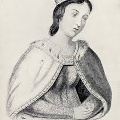
In 1227, Henry married Eleanor of Provence, whose sister was the wife of King Louis IX of France. They eventually had five children: Edward, Margaret, Beatrice, Edmund, and Katherine. Their eldest son would become King Edward I. A quiet, pious man, Henry became known for public demonstrations of piety and often went on religious pilgrimages to abbeys within his realm. He was also a fan and possessor of several holy relics. He declared his intention to join the Crusades in the 1250s but did not follow through. Henry was not a fan of people of the Jewish faith. He encouraged efforts to force Jews to convert to Christianity and, in the 1253 Statute of Jewry, tried to stop the construction of synagogues within English borders. Also about the same time, Henry went to great lengths to have his second son, Edmund, declared King of Sicily; he was not successful, nor was he instrumental in electing a new Holy Roman Emperor, but not for lack of trying. Early in his reign, Henry set about trying to regain some of the lands that his father had lost. John, succeeding his older brother Richard as king, had tried to hold on to what was left of the Angevin Empire, the large swath of land controlled by their father, Henry II. Through his marriage to Eleanor of Aquitaine, Henry II had gained a large amount of land in France and a large amount of money and influence. First Richard and then especially John lost control of much of what Henry had won or inherited. The third King Henry decided, once he ruled in his own right, to launch a series of campaigns in France. Henry attacked Gascony, to little advantage, and then targeted Louis IX himself in Poitou, to no great effect. Henry also doled out high-ranking positions in government and English church hierarchy to family members, angering some locals whose support he needed. For example, he named his half-brother, William de Valence, to succeed William Marshal as Earl of Pembroke. Henry's mother had married again, to a Frenchman, and this family was the one whose influence over Henry the English barons distrusted. As well, Henry returned to the kind of aggressive tax schemes that his father surely enjoyed but were not very popular with taxpayers, particularly wealthy ones. 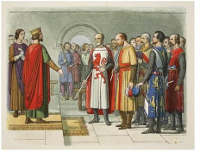
By 1258, the barons had had enough and took Henry to task, reminding him that he needed their support in order to govern effectively. In one particularly memorable episode, a baron named Roger Bidog marched into Westminster in the middle of a conference that Henry was having with some advisors and delivered an ultimatum. Henry, fearing arrest and imprisonment, agreed to a restatement of Magna Carta, known as the Provisions of Oxford, which created a council of 15 nobles who would be his advisors. One of those nobles was his brother-in-law, Simon de Montfort, the Earl of Leicester. Simon's wife was Henry's sister, Eleanor. Henry tired of seeking his council's advice and dismissed them in 1261, reasserting personal rule. This was not a popular move with many people. As well, Henry's wife, Queen Eleanor, was not well liked, especially in London. In one well-known incident of extreme disrespect, unruly Londoners pelted the queen with rotten garbage while she was sailing down the Thames. By 1264, the barons had had enough and decided to revolt. The Second Barons War began. (The First Barons War was a struggle between nobles and King John, after John renounced Magna Carta.) By this time, Simon de Montfort had become disillusioned with Henry III. It was Montfort who led an armed rebellion against the king. The two sides met in a fierce battle near the town of Lewes in 1264. The forces of Montfort were victorious, and Henry, who was himself taken prisoner, handed over his son, Edward, as a prisoner as well. The victorious barons forced Henry to relinquish much of his power; after this, Montfort took on all the trappings of a monarch for a time. 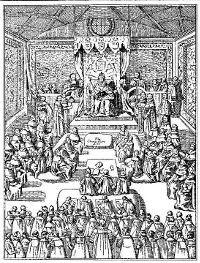
Acting in the king's name but with a purpose all his own, Montfort issued a call for a Parliament. Unlike the Witans of old, however, which were made up of only nobles, this gathering was to include commoners as well. Also, Montfort called for men to come from many major cities, not just a few select places. The Parliament first met on January 20, 1265, at the Palace of Westminster in London. Henry III was in attendance. The Parliament met off and on for another few months, then dispersed. It was not until long after that the idea of a Parliament meeting regularly in session as put into practice. Henry's oldest son, Edward, escaped the house arrest under which he and his father had been placed after their defeat at the Battle of Lewes. William set about rallying forces loyal to the king, and royal army squared off against rebel army. In the titanic struggle of the Battle of Evesham in 1265, Edward proved the better commander and Montfort was killed. Henry was on the battlefield that day, still under official arrest of Montfort. He was nearly killed because he was wearing Montfort's colors; at the last second, Henry screamed out, "Save me! Save me! I am Henry of Winchester!" The would-be kingslayer put his sword away and spirited the king away out of the fray. At the end of the day, Henry III was back in charge. He annulled the Provisions of Oxford in 1266. Henry had high-level dealings with Ireland, Scotland, and Wales during his long reign.
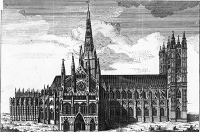
Henry, who had been a fan of art and architecture and had commissioned several great works when he wasn't squabbling over politics, set about rebuilding both the royal palace, at Westminster, and Westminster Abbey. He also sponsored major reworkings of the Tower of London, Windsor Castle, and of buildings at Dover and Lincoln. To Winchester Castle he added the Great Hall. Henry had an affinity for Edward the Confessor, the 11th-Century monarch whose sudden death touched off a series of political struggles and military invasions that led to the Norman Conquest. Henry named his first son after Edward. In 1269, when the rebuilt Winchester Abbey was consecrated, Henry had Edward the Confessor's body moved there. Henry himself helped carry the coffin. In 1270, Henry's oldest son, Edward, left England to fight in the Eighth Crusade. Henry announced his intention to go as well but, too weak from several years of infirmity, died at Westminster on Nov. 16, 1272. He was buried in the Abbey, next to the monarch he so revered. Edward slowly made his way back to England, returning in 1274, when he was crowned King Edward I. |
|
Social Studies for Kids
copyright 2002–2026
David White




